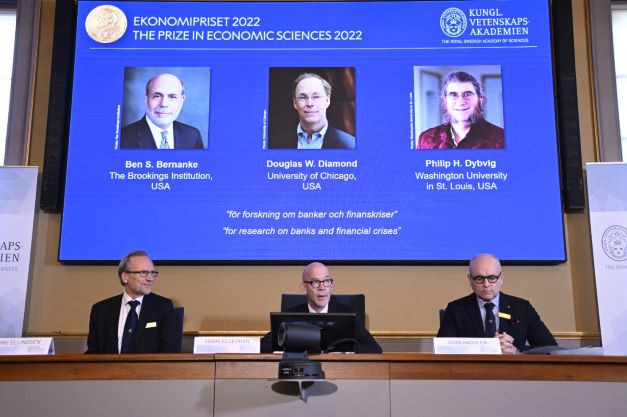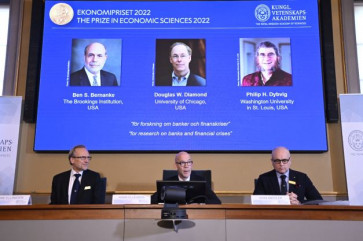Popular Reads
Top Results
Can't find what you're looking for?
View all search resultsPopular Reads
Top Results
Can't find what you're looking for?
View all search resultsLesson from the 2022 Nobel laureates on financial crisis
Today, financial regulatory and supervisory frameworks are improving, but vulnerabilities can erupt from monetary policy swings.
Change text size
Gift Premium Articles
to Anyone
 Coveted prize: Secretary-general of the Royal Swedish Academy of Sciences, Hans Ellegren (center) and members of the Economics Nobel Prize committee Tore Ellingsen (left) and John Hassler announce the winners of the 2022 Nobel Economic Prize at the Royal Swedish Academy of Sciences in Stockholm, on Oct. 10, 2022.. (AFO/TT News Agency/Anders Wiklund )
Coveted prize: Secretary-general of the Royal Swedish Academy of Sciences, Hans Ellegren (center) and members of the Economics Nobel Prize committee Tore Ellingsen (left) and John Hassler announce the winners of the 2022 Nobel Economic Prize at the Royal Swedish Academy of Sciences in Stockholm, on Oct. 10, 2022.. (AFO/TT News Agency/Anders Wiklund )
E
conomics is sometimes satirized as “nothing more than common sense made complicated”. Yet, common sense scientifically developed into a model or theory has often been able to explain and solve complicated problems.
In this regard, awarding the 2022 Nobel Prize in Economics to Douglas Diamond, Philip Dybvig and Ben Bernanke is testimony to the importance of these models and theories. Their works since the early 1980s have improved the previous lack of understanding of how banks work and how when they fail this causes a financial crisis.
Diamond and Dybvig (1983) modeled how banks worked as the depositories for savers’ funds and channeled them as loans to borrowers while the funds could not instantly be withdrawn. In normal circumstances, such liquidity transformations worked well to generate wealth in society. However, this led to bank runs if savers panicked and withdrew their funds simultaneously, thereby causing bank failures due to liquidity mismatch. The model suggested deposit insurance to protect savers against bank failures.
Bernanke (1983) simulated the Great Depression in the 1930s and explained how bank runs were a crucial factor in the unusually deep and prolonged economic crisis. The financial disruptions of 1930-1933 lowered the efficiency of the credit allocation process due to the higher costs and reduced credit availability. Well-performed institutions may become ineffective during periods when exogenous shocks or policy mistakes cause economic deterioration.
Then, Bernanke, Gertler and Gilchrist (1996) pioneered a “financial accelerator” model, which hypothesized that endogenous developments in the credit market propagated shocks in the business cycle. In an economic upturn, inflation and interest rates are low, credit is cheap and businesses and households take overextended loans. In an economic downturn, inflation and interest rates hike, borrowers get depressed paying higher loan installments and banks abandon financially weaker companies and consumers.
Banks tend to only lend credit to financially stronger institutions, but as more of them struggle with less income, they are also abandoned, a situation called a feedback loop. The loop persists until banks avert further credit exposure, stop economic activities and prolong the downturn to lead to recession and, at worst, depression. The effect of the credit market on the economy had previously been known, but Bernanke’s model offered better policy guidance.
In 2006-2014 Bernanke was at the helm of the United States Federal Reserve. He had an opportunity to test his academic works in the real-world laboratory during the 2007-2008 financial crisis


















